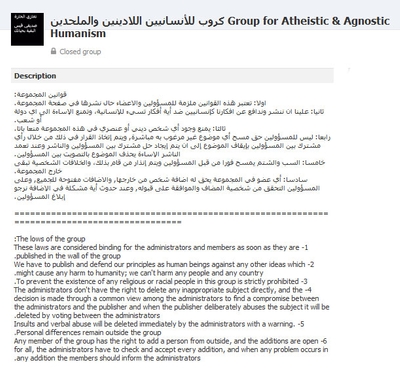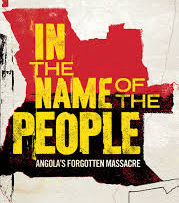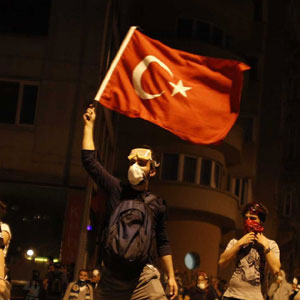
At a meeting of Middle Eastern atheists and agnostics, Aziz´s question is a little unexpected. Perhaps he meant to arrive at a sci-fi film convention, where his shaved head and aviator sunglasses would have fit in perfectly. Seeing he has not been understood, Aziz clarifies: “As in, do you still believe in god?”
He is speaking at the rooftop café of a discreet downtown Cairo hotel, for the third-ever meeting of the Group for Atheistic & Agnostic Humanism (GAAH). Being ejected out of a computer simulation from the “Matrix” films is an apt metaphor for the experiences of group members. They were all born into religious families, grew up around religious friends, studied at religious schools. Any doubts or questions about the existence of god had to be kept private, so their search for answers – and like-minded people – inevitably drove them online.
As Aziz explains, GAAH is a Facebook community for these lost souls: “We are building a safety net for atheists, who are mostly isolated in the Arab world. It’s like the first time you jerk off; you think you’re the only one. It feels so wrong, but then you discover others… you are scared of the religious establishment, but the group gives you courage to express your own beliefs.”
Like many of those present, Aziz is young, male, and a privileged “Khaleeji”: an Arabic term to describe someone of the oil-rich gulf countries. He is from Kuwait, and is the head of another online organisation there called Infidels Anonymous, which has been active since 2009.
This meeting of GAAH has only attracted about 20 people, out of a total group membership of 1,006 (this had grown to 1,336 by mid-July 2011). Yet, it is the largest gathering so far of the six-month old community, which claims to be the biggest of its type in the Middle East. Before the Arab Spring uprising, most attendants were too scared to meet in person, but now they see things in a new light.
The founder of GAAH itself is pony-tailed, shisha-smoking Yazen Almulla, who left his native Iraq for Egypt five years ago. He found religious violence in his former home difficult to deal with, but has only encountered more of the same in Cairo. “Iraq was actually much less religious than here,” he murmurs wistfully, a claim backed up by the Gallup Worldview 2010 poll, which indicated that 15 percent of Iraqis are irreligious, compared to just three percent in Egypt. Because of this low number, he scoffs at the idea of an imminent revolution in religious attitudes to go hand-in-hand with the recent political upheaval. “I just want to unite the voices of Egypt, Iraq, and others. Maybe in the future we can do something?”
Somebody who does feel a religious revolution coming on is 25-year-old Evan (not real name), one of the local Egyptians in attendance. He is not talking about a progressive change, however. Rather, Evan is worried that the Islamic Brotherhood and other, more extreme religious groups might win power through the upcoming national elections. As for organising their own political party of atheists and agnostics? He isn’t keen: “We don’t interfere with people’s religious views. That’s what Islamists do.”
One of the few women at the meeting is Sarah (also not real name), a 19-year-old medical student who travelled from Alexandria to attend. She dons the hijab yet, like most of the other members, is swigging at a beer. She wears the covering not out of choice, but fear: “I never know who is watching.”
She supported the revolution initially, but was a bit off put when her Caliphatist parents joined the movement to oust former president Mubarak. Sarah says: “They hope for an Islamic state. I reject and fear this.” She wants to leave Egypt, even if a relatively secular government comes to power, as she believes her parents would never accept her agnosticism. “If they knew, they would kill me,” she declares bluntly, “my dream is to move to a country that respects me as a woman…” At this point the city of a thousand minarets launches into a deafening call to prayer, but rather than pausing Sarah simply raises her voice to a yell: “…I tried to convince my family to let me study in Australia, I said for a quality education. They refused because they are suspicious.”
Before joining GAAH, Sarah was running her own group, which she says Facebook shut down after offended Muslims flagged it for abuse. She makes it clear the situation was not unique, rattling off the names of other pages closed by Facebook recently: Allah’s page, Honestly, Atheist Women, Arab Atheists and The Awaited Mehdi.
Even outside of Facebook, expressing irreligious views online can be a tricky business. The oldest member in attendance is 52-year-old Ahmed, another wealthy “Khaleeji”. He started a blog half a decade ago called Arab Humanist Voice. From the outset he battled cyber attacks from Islamist hackers, before finally giving up on the project: “Lost it. Five years gone, [the website was] like one of my kids.”
Ahmed has real children as well, but they are all grown up now. He says he didn’t force atheism on them, but taught them not to be afraid of god. His daughter, he declares proudly, has shunned the hijab.
As for Egypt’s future, Ahmed says society should choose what it wants, even if that means an Islamic state: “They should try it, you don’t know it till you try,” he smiles cheekily before continuing: “I want them to feel the fire of Islamic government.” This, he figures, will be the best way to turn people off religion.
Ahmed should know: at one time he was a fundamentalist himself. Among other things, he says he fundraised for the mujahideen fighting the Russians in Afghanistan. At the end of that war, he channelled his energies into studying the Qur'an first-hand. There, Ahmed found many unanswered questions: “So I turned to the other holy books: Jewish, Christian, even old Babylonian texts. Same problem … religion is a kid’s story, bullshit.” Through the work of secular philosophers such as Nietzsche, he eventually arrived at a worldview free of god.
When Ahmed first “unplugged from the matrix” 20 years ago he had no one to turn to. Gradually, he revealed his opinions to certain friends and colleagues, but it was a slow, risky process. For the younger members of GAAD, finding like-minded people hasn’t been nearly as difficult. A healthy internet community is thriving as the youth of the Middle East surge online. Now, a trickle of these people are starting to come to together in person as well. Social attitudes toward non-believers may not have changed greatly in the region, but at least being a heathen isn’t quite so lonely any more.
The GAAH meeting took place in Cairo in June 2011

